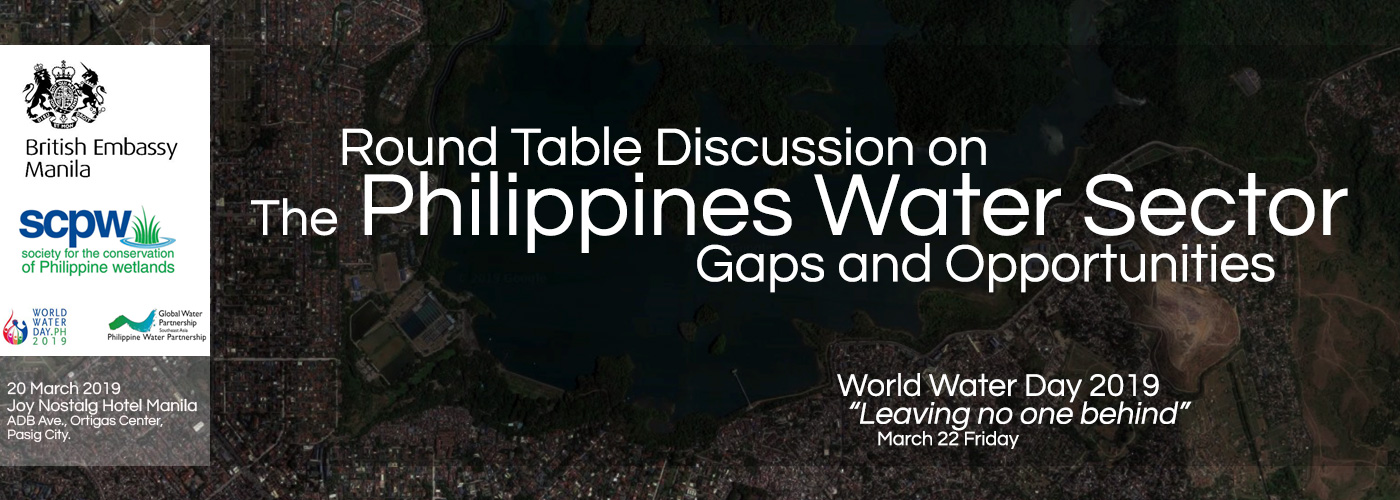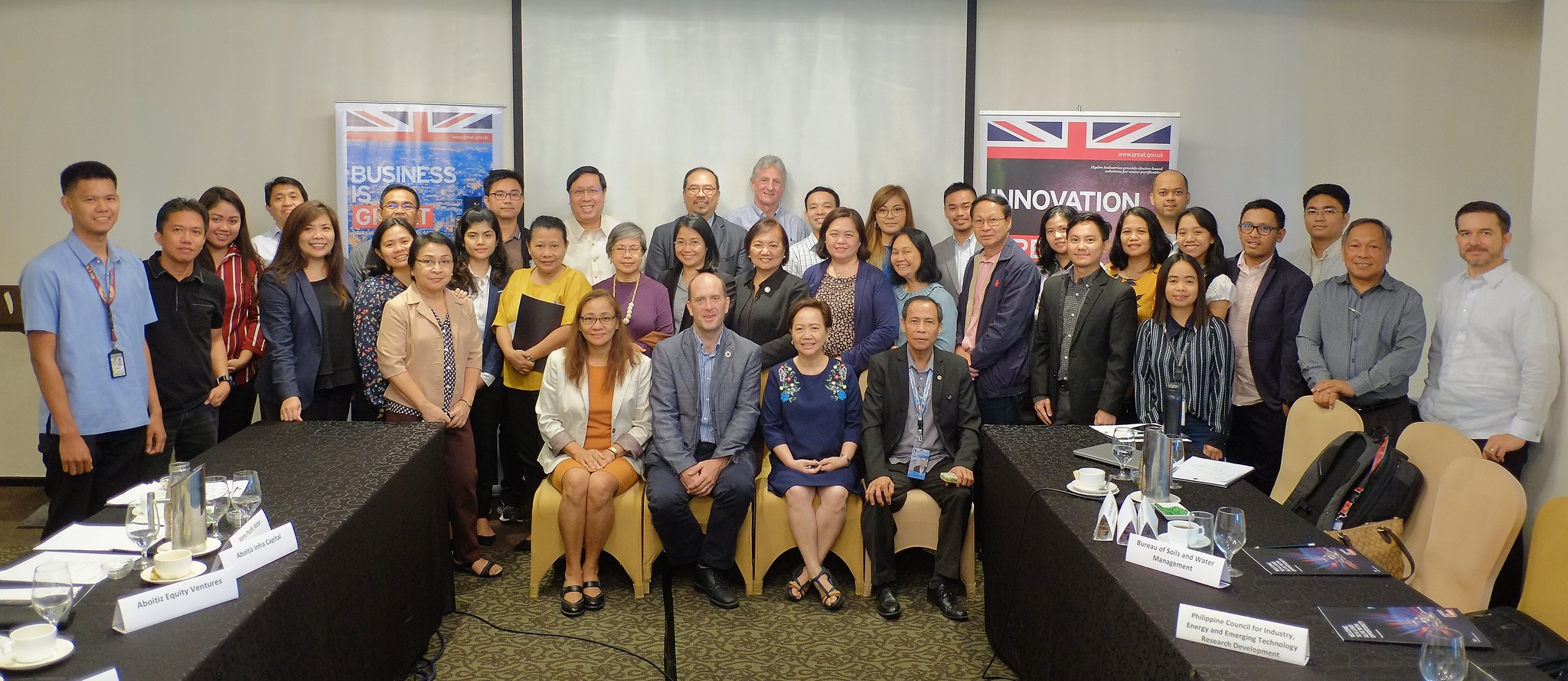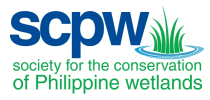
Roundtable Discussion on The Philippines Water Sector: Gaps and Opportunities
20 March 2019 | Joy Nostalg Hotel Manila, ADB Avenue, Ortigas Center, Pasig City
In line with the observance of World Water Day (WWD) which is celebrated on the 22nd of March each year, the Department for International Trade of the British Embassy in partnership with the Society for the Conservation of Philippine Wetlands, Inc. conducted a Round Table Discussion (RTD) on “The Philippines Water Sector: Gaps and Opportunities” on 20 March 2019 at the Joy Nostalg Hotel Manila on ADB Ave., Ortigas Center, Pasig City.
This multi-stakeholder dialogue aimed to enhance relationships among key Philippine oversight agencies on water, private sector, civil society organizations, academe, development partners, and water-end users by sharing what each one is currently doing and in the process identify areas of opportunities for fruitful collaboration.
Moreover, the discussion also aimed to achieve the following specific objectives:
- To promote and enhance relationships among key Philippine oversight agencies on water, private sector, civil society organizations, academe, development partners, and water end-users;
- To share best practices on water conservation and use;
- To identify gaps and opportunities in the water sector in support of Sustainable Development Goal (SDG) 6.
The theme for this year’s WWD is “Leaving no one behind”, highlighting the central promise of the 2030 Agenda for Sustainable Development that, as sustainable development progresses, everyone must benefit. SDG 6 includes a target to ensure availability and sustainable management of water for all by 2030 and this means leaving no one behind. To achieve this target, there is a need for a concerted effort among the actors in the water sector to pursue initiatives that will deliver this result.
In attendance were representatives from Laguna Lake Development Authority, Local Water Utilities Administration, Maynilad Water Serviecs, Inc., Metro Pacific Water, Metropolitan Manila Development Authority, National Hydraulic Research Center, National Water Resources Board, Aboitiz Equity Ventures, Aboitiz Infra Capital, Inc., Britishwater, Inc. Philippines, Bureau of Soils and Water Management, Climate Change Commission, UPLB Inter-disciplinary Studies CEnter for Water, Pepsi-Cola Products Philippines, Inc., Philippine Business for Social Progress, Philippine Council for Industry, Energy and Emerging Technology Research and Development, Philippine Water Partnership, River Basin Control Office – Department of Environment and Natural Resources, SM Investments, The World Bank Philippines, Waterlinks Philippines, The British Embassy, and ARUP.
Ms. Amy Lecciones, Executive Director of the SCPW, highlighted the saying of wetlands practitioners ‘no wetlands, no water’ and ‘no water, no wetlands’ which underscores the simple fact that a healthy wetland or environment, is inextricable with the provision of clean water. Mr. Richard Coley, Director for the Department of International Trade at the British Embassy, noted the peculiar timing of the roundtable discussion with what half of the population of Metro Manila is experiencing now – a water shortage. He identified partnership as the defining theme for discussion. He mentioned that no country – developed or developing, is immune from the problems besetting the water sector but that the UK, as a strong partner for growth of the Philippines, has a wealth of expertise and technology from which to engage with to help alleviate water stress and to provide some solutions to the problems facing the water sector in the country.
Three speakers, Dr. Susan P. Abaño (NWRB), Engr. Danilo T. Basilio (LWUA), and Mr. Adrian Marsden (ARUP) discussed topics on water resources status, challenges, and opportunities; providing universal access to safe water; and the UK capability on water.
Dr. Abaño states that 9 critical areas in the country were already water stressed and that Regions 3, 4, and 7 already had negative water availability. She also mentioned that the coordination of 30 agencies related to water is an institutional challenge. Pollution, extreme weather events, and water demand outstripping insufficient water infrastructure were current challenges. Myriad threats to water resources included subsurface pollution, increasing temperature, drought and sea level rise, conflicting legislative framework, and unreliable water data, among others. She also mentioned that opportunities to partner with KOICA, DOST, IAEA, and more recently with the British Geological Survey and Imperial College London have enabled the NWRB to conduct projects and initiatives aimed at these gaps and threats.
Engr. Basilio stated that the LWUA is a specialised lending institution authorised with the formation of water districts but at an optional basis. He stated that this was a problem since the creation of the water district required an ordinance from the Sangguniang Bayan. He also explained the typical water resources used by a water district and the sources of pollution. He mentioned that the LWUA has implemented standards introduced under the Philippine National Standard for Drinking Water of 2017 – which includes standards for drinking water, for water sampling and examination, and for other mode of distribution of drinking water. He then delineated the different funding mechanisms which are financing current projects of the LWUA in support of its mandate.
Mr. Marsden remarked that the Philippines water concessions are closely similar to the model and regulatory system used in the United Kingdom. The challenges, he says, include integrated solutions, tying up with Sustainable Development Goals, and committing to a framework for solution. He discussed current projects in the UK which have parallels to what might be needed in the Philippines considering its current context – and how this infrastructure was implemented in the UK using techniques, approaches, and designs which have yet to be fully used in the Philippine setting. He expounded on European Union Directives which were pivotal in shaping the UK water sector and also on the level of investments being made in the Philippines in relation to those that were made in the UK. He emphasised that ARUP has the special capability to implement the knowledge and technology to work across the water cycle towards solutions that improve not only the water quality and quantity of a city but its liveability as well. He highlighted the need for partnership throughout the water cycle to push forward the interventions that will create the best value so that a sustainable water legacy for the future can be achieved.
An energetic and positive discussion was facilitated by Mr Ramon Alikpala, with the themes of partnership, technology, value creation, social awareness, social responsibility, data management, water management, watershed approach, smart cities, blue and green development, water sector leadership, private sector engagement, public-private partnerships, and the creation of a water department among many, as those mentioned.
Presentations of the speakers (available for downloading):
Dr Susan P. Abaño (NWRB)- Water Resources in the Philippines: Status, Challenges, and Opportunities
Engr Danilo T. Basilio (LWUA) – Providing Access to Safe Drinking Water and Sanitation to the Countryside
Mr Adrian Marsden (ARUP) – UK Capabiliy on Water: World-leading solutions to Water Challenges


